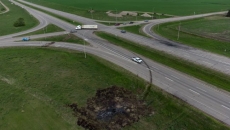WASHINGTON - The Canada-U.S. border will be closed to non-essential traffic in both directions "by mutual consent," the leaders of both countries confirmed Wednesday as efforts across the continent to contain the widening COVID-19 pandemic continued to upend daily life.
Trump disclosed the news on Twitter shortly after stock markets opened, following media reports in both countries that the White House and the federal Liberal government were in talks to limit the cross-border spread of the virus without choking off vital lines of commerce.
"We will be, by mutual consent, temporarily closing our Northern Border with Canada to non-essential traffic," Trump tweeted. "Trade will not be affected."
Prime Minister Justin Trudeau said in a morning news conference outside his home that he spoke with Trump earlier in the day, and likened the measure to the instructions from public-health officials that people avoid visiting their neighbours unless doing so is essential.
"Travellers will no longer be permitted to cross the border for recreation and tourism," Trudeau said.
"In both our countries, we're encouraging people to stay home; we're telling our citizens not to visit their neighbours unless they absolutely have to. This collaborative and reciprocal measure is an extension of that prudent approach."
Essential travel will be allowed to continue to preserve critical supply chains, he added, which means trucks will continue to cross the border to deliver food, fuel and medicine, and essential workers like health-care professionals who live and work on opposite sides will also be permitted to cross.
Government officials also say exemptions will remain in place to ensure Canadians who are now in the United States are able to return home.
Both sides have been in talks on how to limit travel in both directions across the border without restricting the all-important flow of trade and commerce between the two countries at a time when the global economy is under severe pressure.
On Tuesday, Deputy Prime Minister Chrystia Freeland made it clear that the government, which has for the moment exempted U.S. citizens from its own ban on foreign nationals, had been preoccupied with finding a mutually agreeable solution to the border conundrum.
"Nearly 200,000 people cross that border every day and that border and that traffic that goes across that border is literally a lifeline for both the Canadians and the Americans on both sides of that border," Freeland said.
"We get our groceries thanks to truckers who drive back and forth across that border. Very urgently needed medical supplies and medicines go back and forth across that border. And essential workers go back and forth across that border every day. So it is a unique relationship for Canada and it's important for us in handling our situation on the border to be sure that we act to get things right."
Health Minister Patty Hajdu, whose Thunder Bay-Superior North riding in Ontario is near the Minnesota border, cited a number of examples of what the government would consider non-essential travel, such as shopping trips by residents of border communities — "things that people have taken for granted in a border town for a very long time."
Trump, whose first term was often marked by a combative relationship with Canada as the U.S. sought to renegotiate the North American Free Trade Agreement, sounded a far more conciliatory note when he spoke publicly on Tuesday.
"The relationship is outstanding with both (Canada and Mexico) — outstanding," Trump said, citing in particular NAFTA's replacement, the U.S.-Mexico-Canada Agreement, which Canada finally approved late last week before temporarily shutting down Parliament.
Citing Trump administration sources, the New York Times reported Tuesday that asylum-seekers and others trying to cross the southern border illegally would be turned away immediately in an effort to protect border agents and keep COVID-19 out of U.S. detention facilities. U.S. citizens and green-card holders would still be allowed to enter the country, the Times said.
Dan Ujczo, a trade lawyer in Columbus, Ohio, who specializes in Canada-U.S. issues, said business and trade interests in the two countries, along with governments at every level, have been working on solutions ever since the terrorist attacks of Sept. 11, 2001 exposed the absence of suitable contingency plans.
Since then, so-called "trusted trader" programs like Free and Secure Trade and Partners in Protection have advanced the idea that whatever the circumstances, cross-border commerce must be allowed to continue, he said.
"Companies enrolled in these programs likely will have continued access to ensure cross-border trade."

